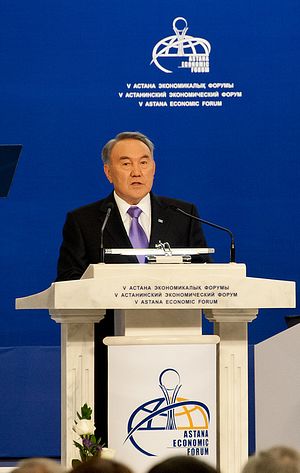Kazakhstan’s president has announced that the country is dipping into its oil reserve fund to pay for an ambitious new economic development program in an attempt to stave off what he says are looming “ordeals” for the global economy.
President Nursultan Nazarbayev made the announcement in an address to the nation, which he normally gives at the beginning of the year rather than in November. That accelerated schedule, plus Nazarbayev’s foreboding language, suggested an urgency that grabbed attention both inside and outside Kazakhstan.
“Based on my personal experience I foresee that the coming years will be a time of global ordeals. The entire architecture of the world will change,” Nazarbayev said. Kazakhstan’s economy, though the most vibrant in Central Asia, is under threat both from the falling price of oil (its major export) and the pressures on the economy of Russia, its neighbor to whose market it is now joined in a Customs Union. The International Monetary Fund recently lowered its estimates for Kazakhstan’s GDP growth for this year to 4.6 percent, down from 6 percent last year.
“Today the entire world is struggling with new challenges and threats,” Nazarbayev said, noting that the world economy has not yet entirely gotten over the crisis of 2007-9. “A geopolitical crisis and the sanctions policies of the leading powers create additional barriers for the recovery of the world economy… Kazakhstan, as part of the world economy and a country located in immediate proximity to the epicenter of geopolitical tension, is experiencing the negative effects of all these processes,” he said.
In response, Nazarbayev announced an economic development program called Nury Zhol (“Bright Road” in Kazakh). It would be financed by dipping into the country’s National Fund, established in 2000 to save oil revenues and now totaling close to $80 billion. The country will spend $3 billion out of that fund for each of the next three years on Nury Zhol, which will include infrastructure projects like road, rail, and air transportation (especially focused on the newly built capital, Astana) and improving transportation networks oriented toward China in the East and toward the Caspian Sea in the West. The program will also include utilities infrastructure improvements and aid for low-income residents to buy homes.
The initiative was generally well received. “It’s exactly this sobriety of vision, far from complacency, that distinguishes Kazakhstan’s leader from most of his colleagues” in the former Soviet Union, said Russian Central Asia expert Arkady Dubnov in an interview with the newspaper Nezavisimaya Gazeta.
“The events of 2014 – the devaluation of the [national currency] tenge in February, the drop in the rate of GDP growth, the events around Ukraine and the sanctions on Russia – all this has caused some worry, maybe not yet very noticeable but nevertheless there, in Kazakhstani society,” said Zharas Akhmetov, director of the company Oil Gas Project, in an interview with Kazakhstan newspaper Kursiv. “It stands to reason that the president decided not to wait for those worries to get stronger and to take a sharper form.”
Nevertheless, the dramatic move is not likely to please Moscow. The Russian government has strained to put a brave face on its country’s economic woes, no doubt worried about the social ramifications if Russians begin to sense declining living standards. And so Nazarbayev’s dire predictions stand as an unwelcome, and sobering, counterpoint.

































